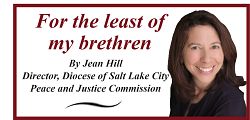We are Responsible for Protecting Children
There is no excuse for abusing children. Whatever the method used – physical, sexual, mental – no child has ever earned, invited, or deserved such actions from another.
That adults, and usually a trusted adult, abuse children is a tragic reality. Why adults choose to abuse children is less well understood, even by highly trained professionals. Yet, news and information sites are full of definitive-sounding explanations for why clergy abused children. Some theorize that all sexual abuse of children by priests is due primarily to gay men in the priesthood, some are certain the problem will be solved by allowing priests to marry, and some insist the only way to end sexual abuse of children is to dissolve the priesthood altogether.
Each of these theories offers something to those who share the same biases, but none offers a valid solution.
Why can’t we stop clergy sexual abuse by barring gay men from the priesthood? Because sexual orientation does not predispose a person to molest children. In fact, studies show the vast majority (82 percent) of perpetrators are in heterosexual relationships with a close relative of the victim.
Why wouldn’t marriage for priests solve the problem? Because child molestation and/or pedophilia aren’t resolved through marriage. In fact, individuals are quite capable of marrying and having regular sexual relations with a spouse while also molesting children. While clergy abuse makes headlines, as noted above, the majority of child sexual abuse occurs within family relationships.
Why not eliminate the priesthood, then? Because the percentage of priests (4 percent) who abuse children is similar to that of teachers (5 percent to 7 percent), scout leaders, clergy of other denominations, and any other individuals who work or volunteer in fields where they have unsupervised access to children.
Not surprisingly, child molesters and pedophiles will seek out places where they are likely to find more children than adults, such as schools, churches, scout troops, youth sports, recreation centers and increasingly, thanks to the miracle of modern technology, the internet.
Equally unsurprising, there is no one characteristic that can be used to determine who will molest a child. Child molesters come from all walks of life, all backgrounds, all circumstances. Many will commit their horrible acts once and never again, some will commit an act of molestation while a child or teen themselves. For some, it will be an act of experimentation, frustration, opportunity or boredom. For others, there may be a deep-seated sexual deviation toward children.
Sadly, there are some common characteristics among victims. It is often the child who is least likely to be believed who is more likely to be targeted. The lonely, sad, troubled or rule-breaking child is viewed as easier prey, as is a child with a disability.
As much as we would like a simple solution, addressing sexual abuse within the clergy is just as complicated as it has proven to be among the general population. What will help, and is one solution that the Church in the United States began implementing with the Dallas Charter in 2002, is ending the far-too-common practice of covering up allegations of abuse by churches across denominations, schools, sports programs and other arenas serving children. Addressing allegations and removing any offender from a position of access to children is critical.
People of faith, parents, concerned citizens all have a role in protecting children. As state law requires, we all need to report any reason to suspect child abuse of any kind to law enforcement. We need to listen to our children when they don’t want to be around a particular person. We need to ask the hard questions. We need to ensure our children know what is OK touch and what isn’t, and ensure they feel safe telling us when something isn’t right. We don’t need to be paranoid about every innocent touch, but we do need to recognize that children are vulnerable and need adults to care for, nurture and listen to them.
As the social doctrine of the Catholic Church reminds us, “special attention must be devoted to the children by developing a profound esteem for their personal dignity and great respect and generous concern for their rights.” It is our responsibility to protect the safety of children and their rights to live free from abuse.
Jean Hill is director of the Diocese of Salt Lake City Office of Life, Justice and Peace. She can be reached at jean.hill@dioslc.org.
© Copyright 2025 The Diocese of Salt Lake City. All rights reserved.


Stay Connected With Us